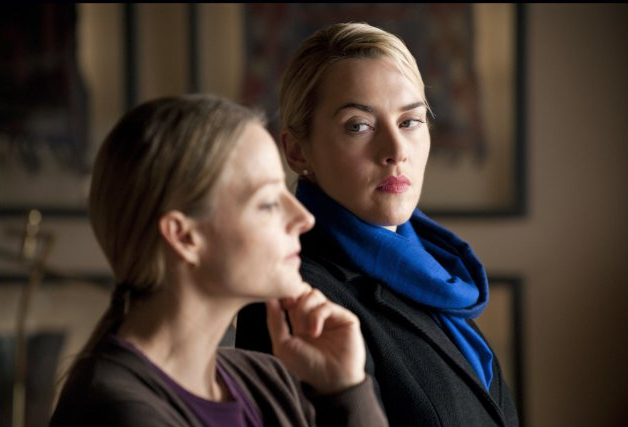Carnage
Carnage tells the story of two couples who meet to discuss in as civilized and understanding a manner as possible the schoolyard spat of their sons that resulted in broken teeth and harsh words. One pair of parents comes to the other pair’s apartment to discuss the situation. After they come to an agreement about the wording of a document describing the incident, things start going downhill.
For an excruciating hour and a half, the two couples bicker, display their own insecurities and their failed marriages. The setup is a typical huis clos, like the play by that name, translated in English into No Exit, which Sartre based on the judicial principle of the huis clos or a hearing that takes place behind closed doors. But where a strong huis clos follows a progression toward mayhem and having it all out (think of the classic of the genre, Who’s Afraid of Virginia Woolf,) Carnage goes in circles. Nancy (Kate Winslet), Alan (Christoph Waltz), Penelope (Jodie Foster) and Michael (John C. Reilly) have nasty moments then, without missing a beat, revert to being polite and even empathetic.
The screenplay is based on Yasmina Reza’s play, The God of Carnage, not one of her best but rather a hodgepodge of half-baked liberal ideas, references to international tragedies (Darfur) to art (mainly through the coffee table books on Bacon and Kokoshka that Winslet keeps throwing up on—gross but what would a film be today without the obligatory barf fest?), civilized discourse and disquisition about the state of the world, the natural savagery of man, questions of guilt or morality, in mind-numbing clichés.
Add asides about Walter Scott’s Ivanhoe, John Wayne, recipes for cobblers, cell phones, and you have a catalogue of the junk we store in our heads. The performances are as histrionic as they are soulless, with a strident Jodie Foster the least credible of all. Which brings us to the question of Polanski. Do we too often give a pass to directors who have shown great talent and even genius in their early years? Of the thirty plus films he has directed, very few will remain with us. Chinatown, of course, and Rosemary’s Baby. The Pianist, definitely. For the most part, the rest has been miss rather than hit, leaving one to wonder what happened to the exceptionally talented Polanski of the 1960s (Think Repulsion or Knife in the Water)—Life, probably, his more tumultuous than others.







